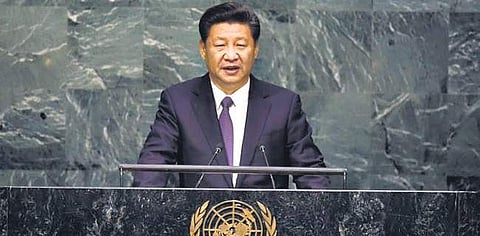

In today’s world, there are times when margin between peace and anarchy is difficult to assess in any measurable manner. The authorities in New York City realised this hard truth to their extreme dismay yet again on November 1, when Sayfullo Saipov, an Uzbek emigrant who entered the US on a Green Card Visa lottery years ago, savagely ran his rental truck into people on a bike path in Lower Manhattan. Five Argentinians, one Belgian and two Americans were killed and several others injured in Saipov’s sudden outburst of violent emotion. The concerned authorities who termed the incident as ‘terrorism’ soon came to grips once more that tranquil times can instantly cede to sudden anarchy.
The episode reflected much more than a deliberate execution of a seemingly pre-meditated terrorist plan.The White House immediately branded the suspect as “an enemy combatant” even as President Donald Trump went on an emotive overdrive, terming the American justice system as a “laughing stock” and calling for death penalty for the perpetrator. Subsequent news reports started vaguely and prematurely pointing toward involvement of the Islamic State (IS).
This is the first post-9/11 act of episodic terror in the US that could evoke recurrent calls for review of city patrolling norms, preventive policing methodologies, immigration processes and related surveillance paradigms instituted under the well-established Homeland Security apparatus. But where a real gap arises lately is that most intelligence services of the world, including the CIA, have been unable to link ‘individual attack modules’, including ‘lone wolves’, with IS base stations that financed, back-ended or provoked such attacks in the first place. While leanings toward Islamic radicalism remain ascertainable, incontrovertible evidence for material instigation by IS or its involvement is always difficult to establish.
But considering that Saipov’s overpowering violence was targeting common and innocent people, it can be categorised as a reflection of his radical Islamic credentials and thereby constituting an act of Islamic terrorism on American ground. Diligent investigations should be able to unearth whether IS was directly involved or not, or the perpetrator acting as a lone wolf.
As far as Islamic radicalism is concerned, some national intelligence and security agencies have often tended to accord a near “pervasive” dimension to the phenomenon. Prolonged sessions within the UN system and other multi-national platforms have done precious little to throw light on the mystical operational philosophy of IS or specifics about its global presence. The irony is that despite the threat perception from IS invariably being assessed as one of an exceptionally high order, the five permanent members of the UN Security Council have failed to forge a consensus among them on how to counter the menace. The UN is shying away from defining terrorism because the P5 members have not agreed on one. The US, Russia, Britain and France—the front runners in the campaign against IS—instead of synergising their military campaigns are neutralising each other’s moves on the battle front in Syria and elsewhere. From an Asian perspective, Beijing is steadfastly protecting Pakistan’s terrorist groups such as Lashkar-e-Taiba (LeT) and Jaish-e-Mohammed (JeM), and literally aiding terror against democratic realms. For the fourth time it has extended ‘statal’ protection to Masood Azhar, mentor of JeM and a proven criminal who has committed serious terrorist offences.
This underlines that time has come to hold China accountable for its imprudent interventions on terrorism in the world’s highest body that is mandated to maintain and establish security in the globe. The unquestionable impetus to terrorism rendered by China could well encourage other UN members to promote international terrorism against their neighbours. The IS can exploit the almost strategic empowerment of proven terrorists through convoluted Chinese versions of according immunity from action to mentoring overlords of brute terror within the UN fold. Given such emboldening of the IS, triggering of more New York-like episodes in free cities of the democratic world cannot also be ruled out.
Little wonder that a kind of consonant ensemble of democracies comprising the US, India, Japan and Australia is fervently seeking to forge meaningful ties to oppose such an authoritarian tenor triggered by Chinese unilateralism over Masood Azhar. Only global operational synergy and regular exchange of intelligence among trustworthy democratic intelligence services on mandated lines can tilt the scales against IS. The UN needs to be in the forefront of such a campaign to help offset the threat potential of Al Qaeda complements and remnants—IS, LeT, JeM, Jalaluddin Haqqani network, Afghan Taliban and Pak Taliban. The P5 nations of the Security Council must strategise curbing of actions by these groups, not exonerate their excesses.
Mohan Das Menon
Former additional secretary, Cabinet Secretariat
mdmenonconsulting@gmail.com